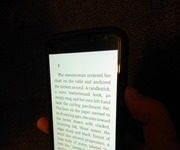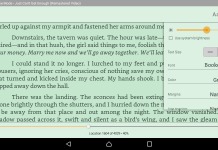 The Kansas City Star is carrying a story by Nicholas Carr warning that e-books may not be as conducive to learning as printed books. Carr points to a pair of studies suggesting that e-books can lead to students paying less attention to the material they read, or being unable to adapt their print reading styles to make efficient use of digital texts.
The Kansas City Star is carrying a story by Nicholas Carr warning that e-books may not be as conducive to learning as printed books. Carr points to a pair of studies suggesting that e-books can lead to students paying less attention to the material they read, or being unable to adapt their print reading styles to make efficient use of digital texts.
E-books are much more rigid [than print books]. Refreshing text on a screen is a far different, and far less flexible, process than flipping through pages. By necessity, a screen-based, software-powered reading device imposes navigational conventions on the user, allowing certain kinds of reading but preventing or hindering others. All sorts of modes of navigation and reading that are easy with printed books become more difficult with electronic books – and even a small degree of added difficulty will quickly frustrate a reader. Whereas a printed book adapts readily to whoever is holding it, an e-book requires the reader to adapt to it.
Certainly, print and e-books tend to be read in different ways, but it’s unclear whether e-books are really as damaging as Carr would have us believe. I would not be surprised to find there were other studies showing that e-reading helps education that Carr ignored in his own piece.
It’s worth noting that Carr has a reputation as a bit of a luddite. He’s posited that we don’t read much anymore because the Internet has harmed our attention spans, and seems to think that hyperlinks in text can be distracting and harmful. It’s not much of a surprise to discover that he thinks paper reading is better than e-reading, too.
(Found via eBookNewser.)

































To be fair, having read Carr’s book, he is basing these claims on empirical studies. I don’t follow his reasoning here, though. How are ebooks more rigid than pbooks? I mean, I can quickly skim, search, jump around quite quickly. Everything I can do with a pbook plus things I can’t.
If anything I have found it to be the opposite. Granted, I am not studying at the moment, only reading fiction. I have found that (at least with fiction reading) an e-reader causes me to read more in depth than I do with a paper book. Primarily because it seems as if it is not as easy for my eye to skim (or to skip ahead pages in a skim/read sequence as I do sometimes with boring sections of paper books)
The article had me at “E-books are much more rigid.” Specifically, it had me laughing. Ebooks are far more versatile and flexible than printed material… except to someone who wants to do things exactly the way they were done with print material. Carr is confusing reading methods that are familiar with methods that are better… they are not necessarily the same thing. He thinks ebooks are a “bandwagon” craze… he is sorely mistaken. Carr himself mentions some of the pros of ebooks, but doesn’t say anything about the ways in which to use them, as he goes out of his way to do with printed material. At any rate, the question is academic: As ebooks develop new and better ways of presenting material (and they still have areas in which they can, and will, do better), those who insist on doing things “the way their pappy did it” will find themselves left behind.
The ‘ebooks are more rigid’ is clearly, from this quote, related to the physical form factor of a pbook versus the device an ebook is read on. And he’s correct. Which would you rather fall asleep reading? A “soft” paper book or a hard plastic ebook reader with sharp edges. And, would you rather someone threw a paperback book at you or a Kindle?
Polarity between screen and print book dispute is silly. The game is decided by their interplay. That faculty and students are conflicted over formats for class texts is good and crucial. Who knows, the use of both print and screen books can be best of all for learning and instruction? But even that is not the point. The intersection, interplay and interdependence of print and screen books is the future…has been so far. And even that is not the point. The print book is not a failed transmission medium; the way it works will be of crucial importance to screen based learning and instruction. One of the problems is the deep, embedded navigation program used in print books, or for that matter, any physical object used to convey conceptual works. The only navigation program associated with screen books that even approaches is touch-screen. The paging maneuvers stink and tactile concept tracking stinks. Another screen detriment is software-transacted navigation. Interface in print is the reader. Our minds know that aspect and screen proficiencies can focus on device and software learning.